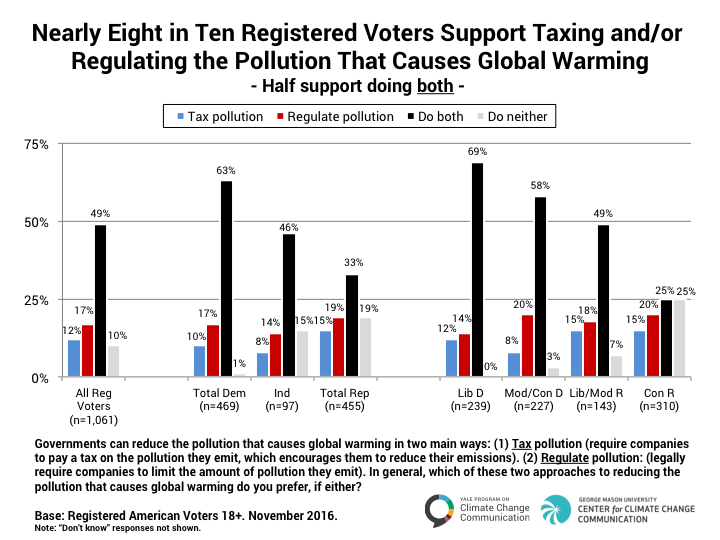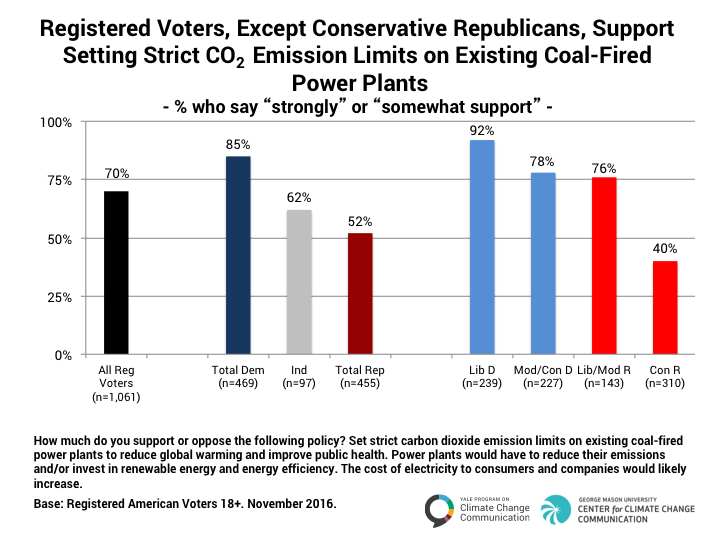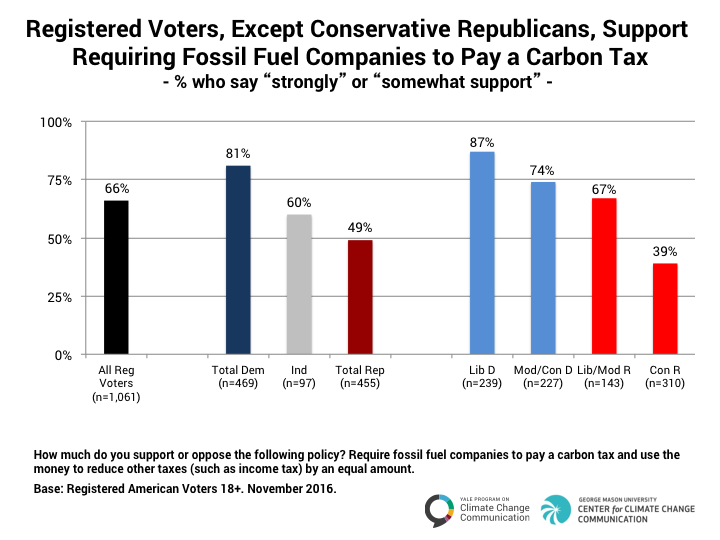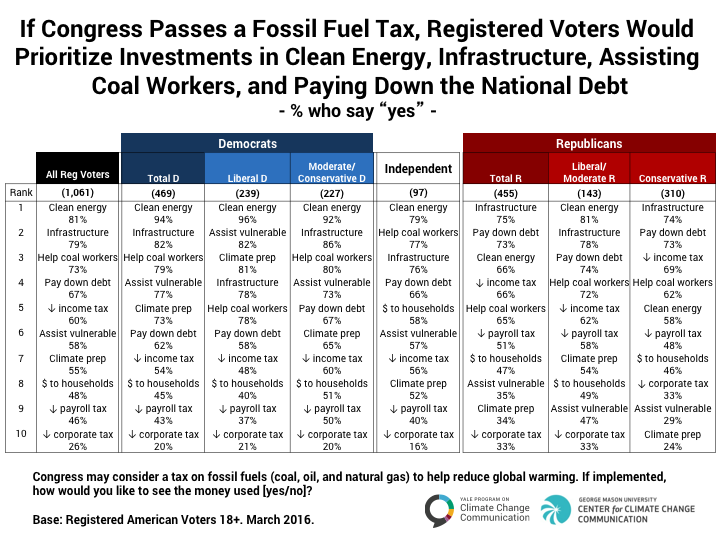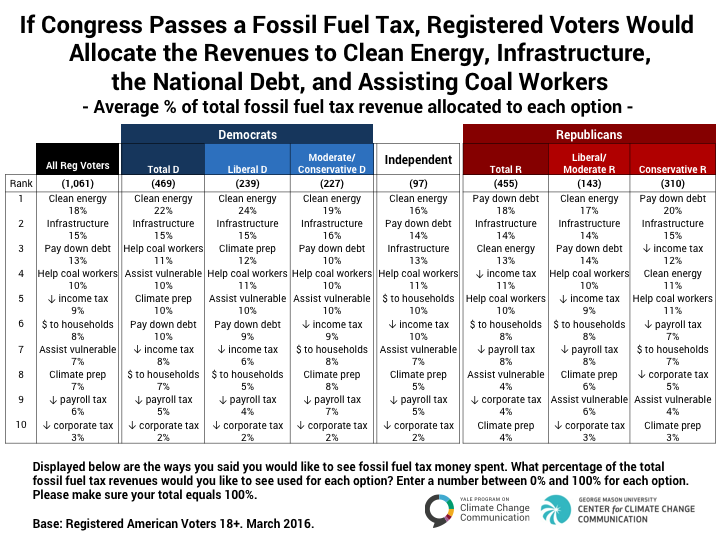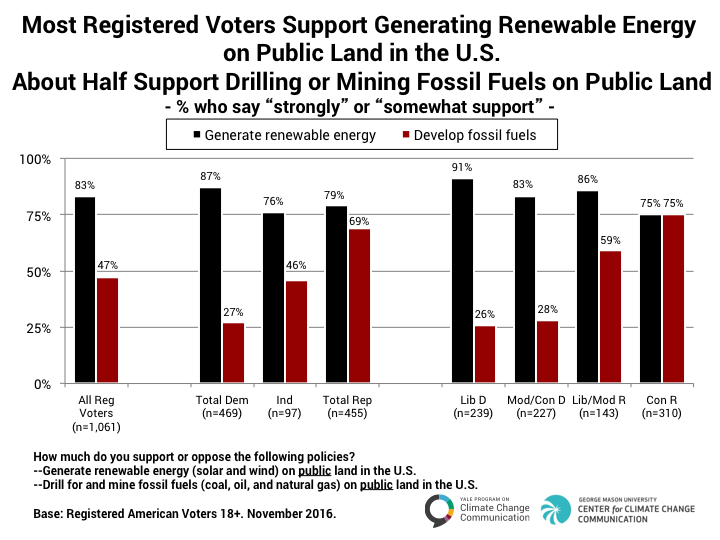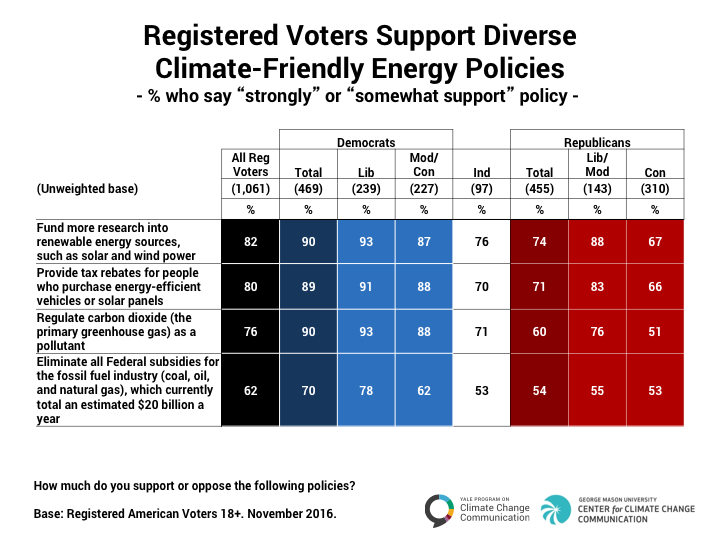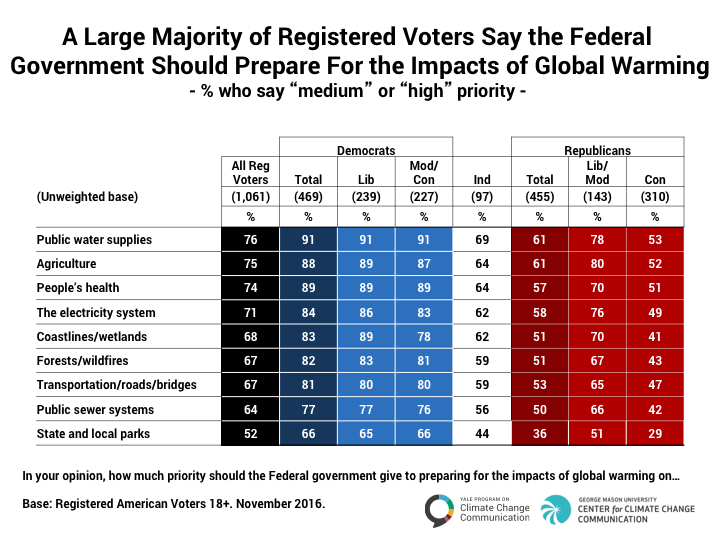Report · Dec 13, 2016
Politics & Global Warming, November 2016
By Anthony Leiserowitz, Edward Maibach, Connie Roser-Renouf, Seth Rosenthal and Matthew Cutler
Filed under: Policy & Politics
3. Support for Policies to Address the Pollution that Causes Global Warming
3.1. Nearly eight in ten registered voters support taxing and/or regulating the pollution that causes global warming, and half support doing both.
Nearly eight out of ten registered voters (78%) support taxing and/or regulating the pollution that causes global warming, and half (49%) support doing both. Only one in ten (10%) support neither approach. Nine in ten Democrats (90%) favor one or both approaches, along with two in three Independents (68%) and Republicans (68%).
Liberal Democrats most strongly favor taking one or both approaches (95%), followed by moderate/conservative Democrats (85%), and liberal/moderate Republicans (82%). Even among conservative Republicans, 61% favor taking one or both approaches.
3.2. Registered voters, except conservative Republicans, support setting strict carbon dioxide emission limits on coal-fired power plants – a core component of the EPA’s Clean Power Plan.
Seven in ten registered voters (70%) support setting strict carbon dioxide emission limits on existing coal-fired power plants to reduce global warming and improve public health, even if the cost of electricity to consumers and companies would likely increase. A majority of Democrats (85%), Independents (62%), and liberal/moderate Republicans (76%) support setting strict limits; four in ten (40%) conservative Republicans support such limits.
3.3. Registered voters, except conservative Republicans, support requiring fossil fuel companies to pay a carbon tax.
Two in three registered voters (66%) support requiring fossil fuel companies to pay a carbon tax and using the money to reduce other taxes (such as income tax) by an equal amount – a plan often referred to as a “revenue neutral carbon tax.”
Democrats (81%), Independents (60%), and liberal/moderate Republicans (67%) are all highly likely to support a revenue-neutral carbon tax. However, only 39% of conservative Republicans support it.
3.4. If Congress passes a fossil fuel tax, registered voters would prioritize investments in clean energy, infrastructure, assisting coal workers, and paying down the national debt.
If Congress were to pass a tax on fossil fuels to help reduce global warming, about eight in ten registered voters would like to see the money used to support the development of clean energy (solar, wind) (81%) and fund improvements to America’s infrastructure (79%). Two in three or more would like to see the money used to assist workers in the coal industry who may lose their jobs as a result of the tax (73%) and to pay down the national debt (67%). The least popular uses of tax revenue are reducing corporate taxes (26%), reducing payroll taxes (46%), or returning the money directly to households in equal amounts (48%).
Democrats and Republicans share many of the same priorities for fossil fuel tax revenues. For instance, 82% of Democrats and 75% of Republicans would use some of the money to fund infrastructure, and 79% of Democrats and 65% of Republicans would assist displaced workers in the coal industry.
Democrats and Republicans differ most in how they would prioritize investment in clean energy: 94% of Democrats would use some of the tax money to do this, compared with 66% of Republicans.
Survey respondents were then asked what percentage of the total revenues from a fossil fuel tax they would allocate to each option they chose. For Democrats, Independents, and liberal/moderate Republicans, the largest allocation was for developing clean energy (18% of the budget allocated, on average, among all registered voters). The next highest allocation priorities among registered voters were improving America’s infrastructure (15%), paying down the national debt (13%), and assisting workers in the coal industry (10%). The smallest allocation was for reducing corporate taxes (3%).
3.5. Most registered voters support generating renewable energy on public land in the U.S. About half support drilling or mining fossil fuels on public land.
Registered voters across the political spectrum support generating renewable energy (solar and wind) on public land in the U.S. This policy has the support of more than eight in ten (83%) of registered voters, including Democrats (87%), Republicans (79%), and Independents (76%).
In contrast, about half of registered voters (47%) support drilling for and mining fossil fuels (coal, oil, and natural gas) on U.S. public land. Seven in ten Republicans support this policy (69%), as do about half of Independents (46%), and about one quarter of Democrats (27%). All political subgroups, except conservative Republicans, support using public land to generate renewable energy more than to develop fossil fuels – conservative Republicans support both equally.
3.6. Registered voters support diverse climate-friendly energy policies.
Registered voters support diverse energy policies, including many designed to reduce carbon pollution and dependence on fossil fuels, and to promote clean energy. Democrats are the most likely to support such policies, but majorities of Independents and Republicans do as well, including:
- Funding more research into renewable energy sources such as solar and wind power (82% of all registered voters, 90% of Democrats, 76% of Independents, and 74% of Republicans).
- Providing tax rebates to people who purchase energy-efficient vehicles or solar panels (80% of all registered voters, 89% of Democrats, 70% of Independents, and 71% of Republicans).
- Regulating carbon dioxide as a pollutant (76% of all registered voters, 90% of Democrats, 71% of Independents, and 60% of Republicans).
- Eliminating all Federal subsidies for the fossil fuel industry (62% of all registered voters, 70% of Democrats, 53% of Independents, and 54% of Republicans).
3.7. A large majority of registered voters say the Federal government should prepare for the impacts of global warming.
Seven in ten or more registered voters say the Federal government should make it a priority to prepare for the impacts of global warming on public water supplies (76%), agriculture (75%), people’s health (74%), and the electricity system (71%).
Six in ten or more say preparing for global warming’s impacts on coastlines/wetlands (68%), forests/wildfires (67%), transportation/roads/bridges (67%), and public sewer systems (64%) should be a priority; about half (52%) say preparing for global warming’s impacts on state and local parks should be a priority.
